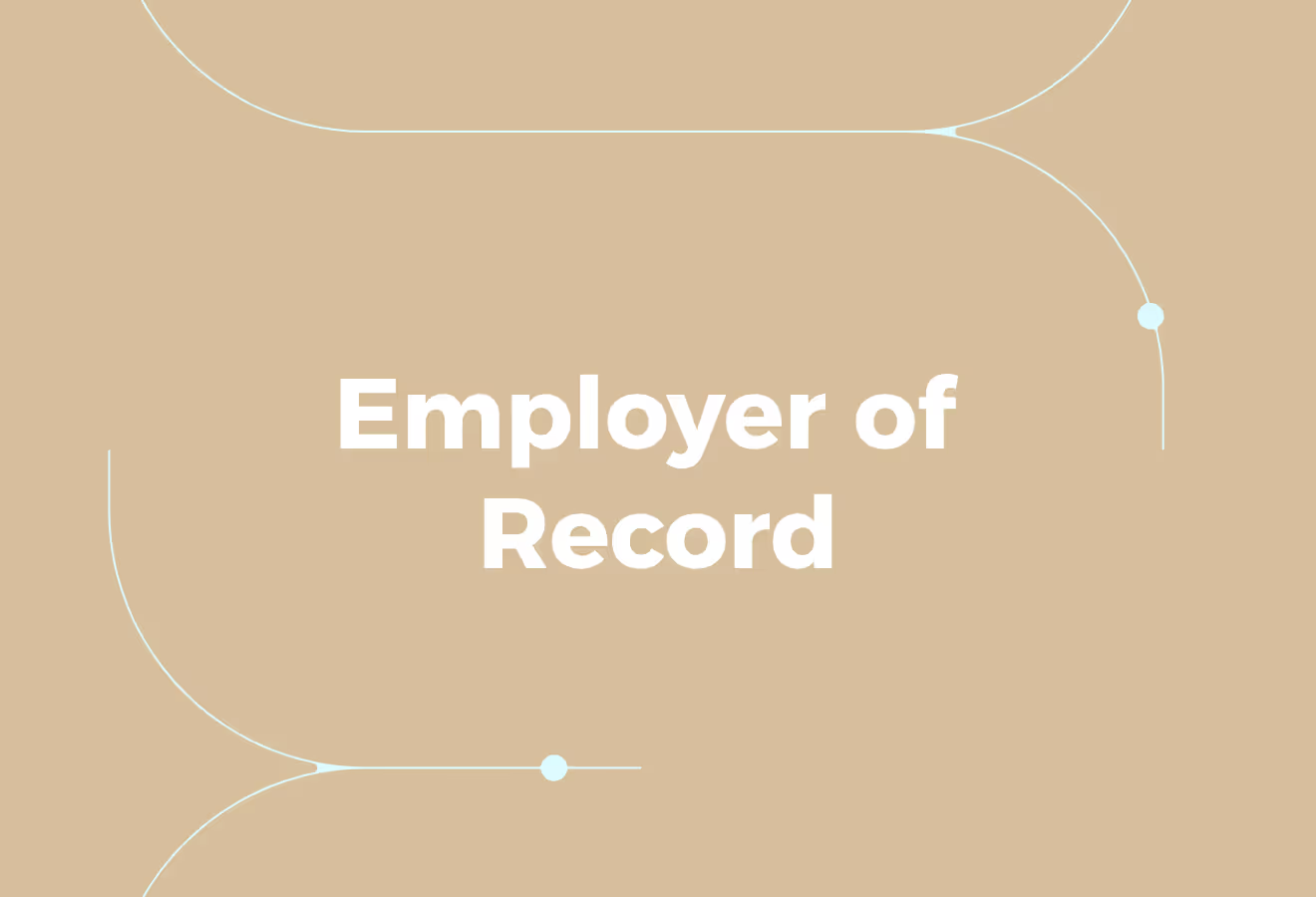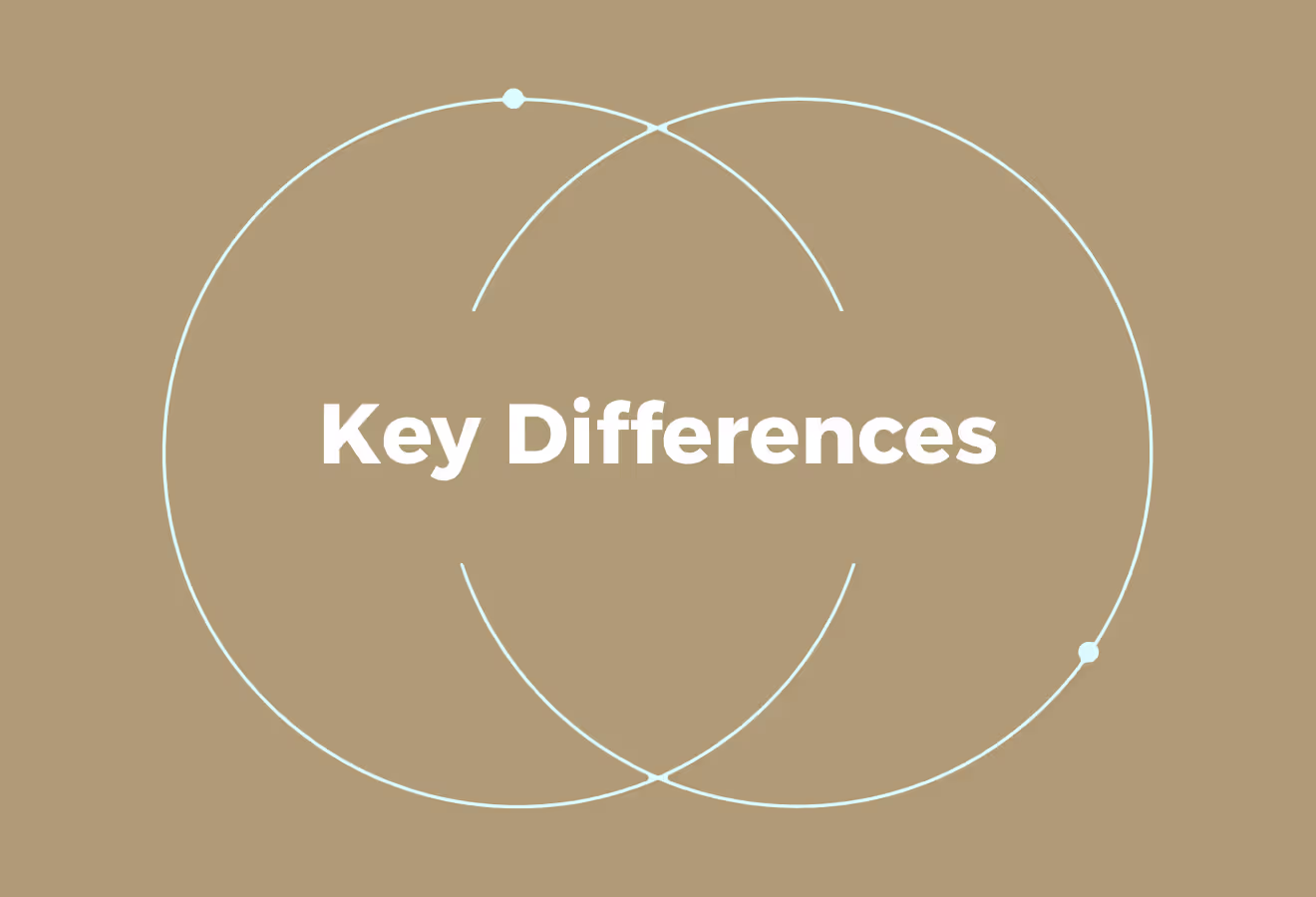Employer of Record vs Staffing Agency (When To Use Each)
.avif)
Employer of Record vs Staffing Agency (When To Use Each)
Understanding the differences between staffing agencies and the best employer of record companies is essential for selecting the right approach based on hiring needs, geographic location, and compliance requirements. To streamline global hiring and ensure compliance, our global HR system helps manage onboarding across borders quickly and efficiently, making it easier for companies to scale internationally with confidence.
What is an Employer of Record?

An Employer of Record (EOR) is a third-party organisation that assumes the legal responsibilities of employing a workforce on behalf of another company. When a business hires international talent through an EOR, the EOR manages, pays, and handles all compliance and regulatory tasks related to that employee on behalf of the business.
The EOR becomes the legal employer of the worker, while the business retains control over the employee’s day-to-day activities. Learn more about Trusted Employer of Record UAE Services.
What Are the Benefits of Using an Employer of Record?
Hiring through an Employer of Record (EOR) can save a business both time and money. The process of setting up a legal entity in a foreign country to employ international talent can be costly and time-consuming.
An EOR helps bypass this complex process entirely, enabling organisations to begin operations more quickly and efficiently.
Cost Savings
Hiring through an Employer of Record (EOR) is often more cost-effective than establishing a legal entity and hiring directly. This is particularly true when hiring five or fewer employees in a given location.
However, as the number of hires increases, the cost benefits of using an EOR diminish. Employing a larger workforce through an EOR can become significantly more expensive over time.
For a detailed breakdown of budgeting considerations, see Transparent Pricing for Your Global Workforce Management.
Streamlined Compliance Management
Understanding and keeping up with local labour laws in all the countries where employees are hired can be complicated. Ensuring compliance is critical, as missteps can lead to costly fines, penalties, and reputational damage.
An Employer of Record (EOR) provides assurance that a company is adhering to regulations across different jurisdictions. Explore the HR Policies in UAE: 2025 Compliance Cheat Sheet to stay compliant.
Flexibility and Scalability
An EOR offers a level of workforce flexibility that traditional employment cannot match. EOR services provide employers with the flexibility to adapt to changing market conditions, project demands, or seasonal variations without the administrative burden associated with traditional hiring and layoffs.
They are a strong solution for trialing expansion into a new location, since employers can quickly begin hiring in another territory with an EOR and just as easily withdraw if plans change.
Learn how to hire globally with ease.
Easy Onboarding and Offboarding
They take the wheel on this process. A major part of the role involves handling compliance and administrative tasks related to hiring and terminating employees, making the entire process significantly simpler.
For helpful tools, see the UAE Online Gratuity Calculator by Cercli.
International Payroll Expertise
Being a payroll expert in one’s home country doesn’t automatically translate to expertise across all international jurisdictions. Each country has its own regulations, tax systems, and legal nuances that must be carefully followed.
An Employer of Record (EOR) helps bridge this gap by offering localised payroll expertise in each specific country of operation. When a company isn’t sure about region-specific requirements, the EOR serves as the reliable knowledge source.
Learn more with the Gratuity Calculator Saudi Arabia.
Mitigating Risks
An employer of record is responsible for managing employment-related risks such as worker misclassification, wage and hour disputes, and employee claims. This not only protects the business but also ensures a fair and reliable payroll process, fostering trust and satisfaction among employees.
For more compliance tools, see Manage HR Documents & Get Compliance Alerts.
What Are the Drawbacks of Using an Employer of Record?
An employer of record is responsible for managing employment-related risks such as worker misclassification, wage and hour disputes, and employee claims. This protects the business while ensuring a fair and reliable payroll process, fostering trust and satisfaction among employees.
For more information, visit Wage Protection System in Saudi Arabia: An Employer’s Guide.
Related Reading
- Consequences of Payroll Errors
- Employer of Record Payrolling
- Challenges of Managing a Global Workforce
Benefits of Partnering with a Staffing Agency

Partnering with a staffing agency provides numerous advantages, such as:
Time and Resource Savings
These benefits, combined with the experience and knowledge of staffing agencies, can help businesses save time and resources. This allows internal teams to concentrate on core business objectives rather than recruitment logistics.
Faster hiring
Staffing companies have a wide network and access to a multitude of job seekers, which significantly speeds up the hiring process. They maintain a constantly updated database of potential candidates, which they can tap into whenever an organisation has a job opening. This extensive network includes both active job seekers and passive candidates who may not be actively searching but are open to new opportunities. Their access to this dynamic pool of talent enables faster matches for roles that need urgent fulfillment.
These agencies also have a deep understanding of the job market and industry trends, allowing them to identify and attract the right talent quickly and efficiently. They use advanced recruitment tools and technologies to streamline the recruitment process and reduce the time it takes to fill a vacancy.
Reduced workload for internal teams
By taking over the recruitment process and administering payroll and benefits, staffing firms reduce the workload of internal HR teams. This shift allows HR professionals to concentrate on essential initiatives that directly impact employee satisfaction and retention.
For example, it enables HR teams to invest more time in employee engagement, training, and development, fostering a more positive and productive organisational culture.
Flexibility in workforce management
Staffing agencies can provide temporary or contract-based workers based on organisational needs, offering greater flexibility in managing the workforce. This adaptability allows companies to scale their staff up or down according to seasonal demands, project requirements, or economic shifts.
It also enables businesses to experiment with new positions or roles without committing to a permanent hire, ensuring a strategic approach to workforce planning.
Specialised hiring
Staffing agencies often specialise in certain sectors or job roles, enabling them to find candidates with the specific skills and experience required. Their specialisation provides a deeper understanding of the industry, making them more adept at identifying the right fit for each role.
They also maintain established relationships with professionals in the sectors they focus on, which helps them source high-quality candidates efficiently.
Reduced hiring risk
A staffing company conducts thorough screenings and interviews, as well as background checks, employment verifications, and reference checks, reducing the risk of hiring unsuitable candidates. This process includes not just evaluating the candidate’s skills and experience but also cultural fit to ensure candidates align with the company's values.
Possible Drawbacks of Working With Staffing Agencies
Despite the many benefits that staffing agencies offer, it’s essential to consider potential drawbacks that may arise. Understanding these potential challenges can help organisations make an informed decision about whether to engage a staffing agency’s services.
Some of the potential challenges to overcome include:
Additional hiring costs
One of the most common concerns is the additional hiring costs associated with using a staffing agency. These costs can impact the overall hiring budget, as the fees for the agency’s services can add up, especially for large-scale recruitment efforts.
However, although these may seem daunting at first, they are actually an investment in the quality of the hires and the efficiency of the hiring process.
When factoring in the time and resources saved by delegating the recruitment process to external professionals, along with the potential increase in productivity from hiring highly qualified candidates, it becomes clear that these costs are justified.
It is important to carefully consider the budget and understand the fee structure of a staffing agency before engaging its services.
Lack of direct control
Organisations may lack direct control over the selection process when using a staffing agency. This can potentially result in mismatches between a candidate’s abilities and the company’s specific requirements.
The agency is responsible for screening and selecting candidates, and its criteria may not always align with the hiring organisation’s expectations.
By carefully selecting a reputable staffing agency and maintaining open communication throughout the recruitment process, this drawback can be mitigated to ensure a successful partnership.
Cercli’s global HR solution
Cercli helps companies in the Middle East manage their entire workforce, whether local or spread across 150+ countries, all within one platform.
Run fully compliant payroll across the UAE, Saudi Arabia, and the wider MENA region. Manage leave, onboard employees, track assets, and handle global contractor payments in multiple currencies with ease.
Whether managing 25 employees or scaling to 500+ across multiple markets, Cercli combines deep local expertise with global capabilities, giving HR teams one simple, compliant system to run operations and pay the workforce anywhere.
Employer of Record vs Staffing Agency Key Differences

Legal Liability and Compliance
An EOR acts as the legal employer of record on behalf of your company. This means it takes on responsibility for employment contracts, payroll compliance, taxes, and statutory benefits in line with local employment laws. For companies expanding into new countries, an EOR allows you to hire and pay workers without setting up a local entity.
In contrast, staffing agencies focus on sourcing and placing candidates. Once an employee is onboarded, especially in a permanent role, your company typically assumes legal responsibility. While agencies must follow fair recruitment practices, they don't manage ongoing compliance, payroll, or benefits.
Cost Implications
Both Employers of Record (EORs) and staffing agencies assist businesses in hiring and managing talent. However, they serve different functions, and which one is right for a business depends on its needs. Discover the Top 10 HR Software Solutions UAE & MENA to support this decision.
Time and Resource Commitment
An EOR acts as the legal employer of record on behalf of a company. This means it takes on responsibility for employment contracts, payroll compliance, taxes, and statutory benefits in line with local employment laws.
For companies expanding into new countries, an EOR enables them to hire and pay workers without setting up a local entity.
See our All-in-One HRIS Platform with Secure Payroll & Integrations for how this works.
Scope of Services
EOR services are centred on employment administration. This includes payroll processing, local tax compliance, and statutory obligations like social contributions. EORs typically do not recruit candidates; that responsibility remains with your company.
Staffing agencies focus on recruitment services, from identifying suitable candidates to coordinating interviews and supporting onboarding. Their core strength lies in talent acquisition rather than compliance management.
Control and Management of Staff
Employers of Record, or EORs, and staffing agencies both help businesses build and manage their workforces. However, they serve very different purposes. An EOR is ideal for businesses that want to employ people compliant with local labour laws in new countries.
A staffing agency, on the other hand, is best suited for companies that need to source candidates quickly. They focus on recruitment, not employment compliance.
Understanding the difference between these two solutions can save your business time and money while reducing risk, especially when expanding into new markets. For more information, check out Cercli Resources: HR, Workforce Management & Payroll.
Related Reading
- Payroll Internal Controls Best Practices
- Payroll and Compliance Challenges
- Payroll Outsourcing Costs
When Should You Use an Employer of Record vs a Staffing Agency?

Staffing agencies are best suited for companies that need help sourcing candidates quickly, especially for short-term, temporary, or hard-to-fill roles. They focus on recruitment, not employment administration. A staffing agency should be considered in the following situations:
Saving Time in Recruitment
Hiring internally can take an average of 44 days, often requiring multiple interview rounds and CV reviews. Staffing agencies can reduce time-to-hire by handling the front-end recruitment work: sourcing, screening, and initial interviews.
This is especially helpful when filling urgent vacancies or roles with high turnover.
Improving Hiring Outcomes
Agencies often maintain talent pools of pre-screened candidates, including those with niche skill sets. They can match your requirements to available talent quickly and accurately, reducing the chances of a poor hire and increasing retention.
Learn more from A Manager’s Guide to Spotting Workplace Burnout Before It’s Too Late.
EORs Handle Employment Compliance and Administration; Staffing Agencies Focus on Recruitment
Employers of Record, or EORs, and staffing agencies both help businesses build and manage their workforces. However, they serve very different purposes.
An EOR is ideal for businesses that want to employ people compliant with local labour laws in new countries. A staffing agency, on the other hand, is best suited for companies that need to source candidates quickly. They focus on recruitment, not employment compliance.
Understanding the difference between these two solutions can save a business time and money while reducing risk, especially when expanding into new markets.
When to Use an Employer of Record (EOR)
An Employer of Record is ideal when a business needs to employ people compliantly in new countries without the cost or complexity of establishing a local legal entity. The EOR acts as the legal employer, taking care of payroll, contracts, statutory benefits, and compliance with local labour laws.
Situations where an EOR may be the right solution include:
Scenarios for using an EOR
- Hiring employees in a country where the business doesn’t yet have a legal entity
- Expanding into a new market quickly without setting up a local branch
- Testing a foreign market before committing to long-term operational costs
- Managing remote international teams while maintaining local labor law compliance
Outsource administrative employment tasks
An EOR handles time-consuming responsibilities like onboarding, payroll processing, tax deductions, benefits enrolment, and compliance with local employment regulations. This frees up internal teams to focus on business priorities while reducing the risk of costly errors or penalties.
Navigate complex international employment
Hiring across borders requires a deep understanding of local employment frameworks. An EOR brings the local knowledge and legal infrastructure needed to manage employees compliantly, especially important when entering unfamiliar jurisdictions or hiring remote staff across multiple countries.
Avoid setting up legal entities
Establishing a company in a new country can take months and requires legal, tax, and HR expertise. With an EOR, you can hire and pay employees in that market without needing a formal presence, saving significant time and cost.
When to Use a Staffing Agency
Cercli helps companies in the Middle East manage their entire workforce, whether local or spread across 150+ countries, all in one platform. Run fully compliant payroll across the UAE, Saudi Arabia, and the wider MENA region.
Manage leave, onboard employees, track assets, and handle global contractor payments in multiple currencies with ease. Whether managing 25 employees or scaling to 500+ across multiple markets, Cercli combines deep local expertise with global capabilities, giving HR teams one simple, compliant system to run operations and pay the workforce anywhere.
To simplify global workforce operations, the product functions as a powerful global HR system.
Related Reading
- Employer of Record vs PEO
- Global EOR
- AI Tools for HR
- Remote Global Payroll
Book a Demo to Speak with Our Team about Our Global HR System
Expanding your workforce across borders can help your company grow and become more resilient. However, the complexities of managing a globally dispersed team can be daunting. Cercli simplifies this process for companies in the Middle East with its employer of record services. Cercli helps businesses manage their entire workforce, whether local or spread across 150+ countries, all in one platform.
Companies can run fully compliant payroll across the UAE, Saudi Arabia, and the wider MENA region, manage leave, onboard employees, track assets, and handle global contractor payments in multiple currencies with ease. Whether you’re managing 25 employees or scaling to 500+ across multiple markets, Cercli combines deep local expertise with global capabilities, giving your HR team one simple, compliant system to run operations and pay your workforce anywhere.










